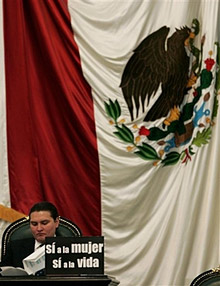 |
 |
 |
 Editorials | Issues | April 2007 Editorials | Issues | April 2007  
Stakes High in Mexico Abortion Debate
 Duncan Kennedy - BBC News Duncan Kennedy - BBC News


| | Jacobo Bonilla, an anti-abortion legislator, reads some papers next to a sign that reads in Spanish 'Yes to Woman, Yes to Life' during a session at Mexico City's Assembly Tuesday, April 24, 2007 as legislators prepare to vote on legalizing abortion. (AP/Eduardo Verdugo) |
There are only 46 of them, but the lawmakers of Mexico City who voted to change the capital's abortion laws may well have changed the course of the debate in Latin America and beyond.

In the end they comfortably beat off their 19 opponents.

Now in Mexico City, a woman will legally be able to have an abortion during the first 12 weeks of her pregnancy. She will no longer be classed as a criminal.

Before the vote, a woman could have been jailed for having an abortion. The only exceptions were if she had been raped, if her life was at risk because of the pregnancy, or if the foetus was malformed.

Now she has a much greater choice.

And there is that word again. Choice. It hovers over every debate on the subject, be it in Mexico or Melbourne.

Champions of women's rights say choice is central to the argument. Opponents say the unborn child has no choice in the matter. That is why it is wrong, they claim.

And it is why they will probably challenge Mexico City's new law in the courts. They may have lost the battle, but they are not going to let the stroke of a legislator's pen stop them in what they see as their war against this scourge of man-made terminations.

Regional debate

The vote in Mexico City drew interest from around the world. That is because in recent times, legislators in other countries have been minded to make abortion harder, not easier.

In Nicaragua recently, all abortions were outlawed. In the United States, the Supreme Court has just upheld the ban on what have become known as partial birth abortions.

But Mexico City has joined the ranks of the more liberal societies of Europe. And that has caused a stir.

In Mexico's region, only the much smaller countries of Cuba, Guyana and Puerto Rico have anything like the more lenient laws just adopted in Mexico City.

It puts Mexico, with its 100m population, at the forefront of a global campaign to give women more control over their bodies and their reproduction. It is why the decision here was so important.

It is also why the Pope indirectly intervened in the debate by urging Mexican bishops to speak out against the measure.

Some obliged. One compared those people in favour of the new law to Hitler. He did, however, criticise those who made death threats against the politicians who supported the new law.

Yes, it is that charged.

Magnet for women

The assembly in Mexico City was ringed by riot police for the debate. They were not needed in the end, but it was one more sign of how polarised the two sides are.

In the weeks before the vote, anti-abortionists would regularly march carrying baby dolls with real knives driven through their hearts and fake blood smeared over the dolls' plastic bodies.

Campaigners for the new law had their own shock tactics.

Those campaigners now want to capitalise on the momentum and get a nationwide law introduced.

That will be harder, as they do not have the same political support in the national assembly or, probably, in the country, as they do in the capital.

But it may not matter, say anti-abortionists, as Mexico City will become a magnet for all women seeking abortions.

There is one matter both sides do agree on. The need to end the 200,000 or more illegal abortions carried out each year in Mexico.

Pro-choice people say a new law was needed. Pro-life critics say better sex education for young people would have been a wiser answer.

It is the pro-choice camp that has come out ahead, though the debate here, and in other countries, will not subside for long.

That is because this issue is literally a matter of life and death and what better moral challenge is there to coalesce around than that. | 
 | |
 |



